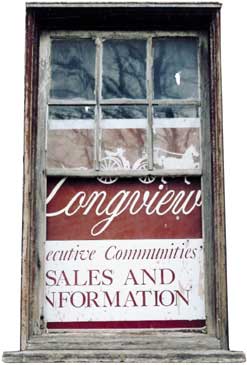SAVE LONGVIEW FARM
Homeowners & Preservationists Align to Prevent Commercial Exploitation of Historic Property

In less than a year, Long acquired nearly three square miles of rural property, 21 miles from his downtown Kansas City office and near the tiny town of Lee's Summit. In 1912, with the help of world famous architect Henry Hoyt, Long began work on his dream project, employing as many as 2000 workers at a time, hundreds of them craftsmen imported from Europe. The landscape architect was none other than Kansas Citian George Kessler, justly famed for his "City Beautiful" work. Kessler executed a masterful plan - in fact, the only rural plan of its kind in the world. Just a year after construction began, work was completed on an estate that lived up to Long's vision. It was simply called, Longview - and it was America's most beautiful farm.
In 1968, Loula Long-Combs, the Queen of the American Royal and the daughter of Robert A. Long, donated a large portion of Longview Farm to the creation of Longview Community College. In 1978, the Army Corp of Engineers acquired 958 acres for the creation of Longview Lake. In all 1,100 acres of the perimeter of Longview Farm are dedicated to education and recreation for the community - a fitting extension of the Long's vision, generosity and dedication to others.
Developer Dean Goodman and a group of investors acquired the remaining 600 acres. Their marketing materials state that "the master-planned Longview Farm was to include exclusive single family homes in a variety of price ranges." These materials provide additional detail.
"Also planned are a shopping mall and a small office research park across from Longview Community College. The historic portion of the property composed of the beautiful mansion, the extraordinary show-horse barn, dairy barns and the 20-acre lake with pergola, are being evaluated by a team of national experts - in the tradition of the Long family - to create the appropriate and economically feasible uses for these structures." In the video sales presentation, the developer promises that the exclusive homes on the property would be "loyal to the principles of its visionary founder." This new community would "capitalize on the rustic natural beauty of the property and carry forward its architectural tradition."
Today, it seems, the developer's idea of "loyal" differs dramatically from that of local and even national historic preservationists as well as the residents of Longview and many in Lee's Summit. To those who have seen it, the marketing video seems no more than an ironic reminder of promises broken and misrepresentations made. Longview Farm is a "failed development," says Jack Bondon, the CEO of Berbigilia's and the owner of 400 acres across from the site of the proposed apartment mega-complex. "It is not in any what was promised time and again."
The developers current proposed plans calls for 300 high-density apartments to be constructed on 25-acres, with as many as 700 densely clustered apartments to be built in all. The second phase includes apartment buildings to be constructed from 3rd street on the north all the way south to Longview Road. These plans would also require the demolition of at least four of Longview's historic structures. In a letter sent to Lee' Summit Mayor Karen Messerli, Jackson County Executive Katheryn Shields took, for a political person, an unusually strong stand on this proposed development.
Shields criticizes the "high-density, high rise" apartments that are a far cry from the stucco, tile-roofed homes originally intended for the property. The development, writes Shields, "appears to be totally opposite of what was promised during the residential development phase of the Longview Farm Property."
The developers are not without arguments of their own. Foremost among them, perhaps, is a Lee's Summit zoning issue that allows for multiple family development. This portion of Longview Farm was zoned in 1986 to accommodate high-end, low-density single-family villas and townhomes - a far cry from the proposed apartment buildings. If the rationale for this zoning decision seems clear to no one, its results displease almost everyone.